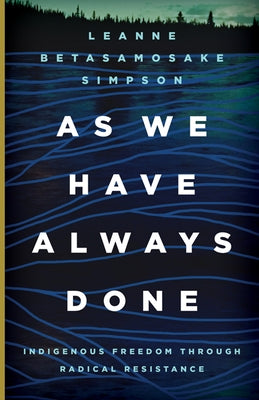Description
Winner: Native American and Indigenous Studies Association's Best Subsequent Book 2017
Honorable Mention: Labriola Center American Indian National Book Award 2017
Across North America, Indigenous acts of resistance have in recent years opposed the removal of federal protections for forests and waterways in Indigenous lands, halted the expansion of tar sands extraction and the pipeline construction at Standing Rock, and demanded justice for murdered and missing Indigenous women. In As We Have Always Done, Leanne Betasamosake Simpson locates Indigenous political resurgence as a practice rooted in uniquely Indigenous theorizing, writing, organizing, and thinking.
Indigenous resistance is a radical rejection of contemporary colonialism focused around the refusal of the dispossession of both Indigenous bodies and land. Simpson makes clear that its goal can no longer be cultural resurgence as a mechanism for inclusion in a multicultural mosaic. Instead, she calls for unapologetic, place-based Indigenous alternatives to the destructive logics of the settler colonial state, including heteropatriarchy, white supremacy, and capitalist exploitation.
Author: Leanne Betasamosake Simpson
Publisher: University of Minnesota Press
Published: 12/29/2020
Pages: 320
Binding Type: Paperback
Weight: 0.84lbs
Size: 8.40h x 5.50w x 1.00d
ISBN13: 9781517903879
ISBN10: 1517903874
BISAC Categories:
- Social Science | Ethnic Studies | American | Native American Studies
- Political Science | Political Ideologies | Radicalism
- Social Science | Discrimination
About the Author
Leanne Betasamosake Simpson is a writer, activist, faculty member at the Dechinta Centre for Research and Learning, and a Distinguished Visiting Professor in the Faculty of Arts at Ryerson University. She is author of several books, including Dancing on Our Turtle's Back, The Gift Is in the Making, Islands of Decolonial Love, and This Accident of Being Lost. She is Michi Saagiig Nishnaabeg, holds a PhD from the University of Manitoba, and is a member of Alderville First Nation.

